#S FCC
Text
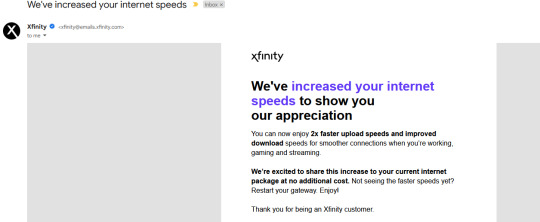
lol. lmao, even
12K notes
·
View notes
Link
Learn expert level Online Oracle FCCS Training in our Best Institute real time Financial Consolidation and Close Cloud Services Certification Training with Course Material Pdf Attend Free Demo for Live Oracle FCCS Tutorial Videos Classes and Download Software Dumps Documentation within reasonable cost in Hyderabad Bangalore Mumbai Delhi India UAE USA Canada Toronto Australia Singapore Malaysia South Africa Brazil Spain Japan China UK Germany London England Dubai Qatar Oman Mexico France Srilanka Pune Noida Chennai Pakistan
#https://www.spiritsofts.com/oracle-fccs-online-training/#Oracle FCCS Online Training: Mastering Financial Consolidation and Close Solutions#Take your financial consolidation and close skills to the next level with our comprehensive Oracle FCCS (Financial Consolidation and Close S#OracleFCCS FinancialConsolidation CloseProcess CloudSolutions FinanceTransformation FinancialReporting DataIntegration DataAccuracy Complian
0 notes
Text
Okay so here's the rundown of everything that happened with the radio station because omg is it some drama.
In the 90's, there were a lot more independently-run radio stations. There wasn't IHeartRadio and there wasn't SiriusFM or JackFM. A dude could just have a radio station frequency and start a radio station as long as they complied with FCC regulations. And one of these radio stations in Columbus was an alternative station called CD101.
That frequency was sold to a classical station, which is fine because the exchange was friendly. And then the station moved to a different frequency, CD102.5.
So I know it may seem like radio DJ's are just weirdos with microphones and that's just not true- they are TALENTED weirdos with a microphone. You have to be personable, you have to know about the music you're playing, you have to be enthusiastic. And this station was pretty good about programming- they played local music, they played deep cuts, they played weird shit. There were programs for oddball and punk and goth music. They ran charities, they were at local festivals, they were in parades. Their radio station even had a small concert venue attached to it and they would invite visiting musicians to play. Like it really was about community.
But.
Radio stations are expensive, and they get more expensive every year, and in 2020 they were unable to renew their FCC license.
And then a couple months later, they were back again under CD 92.9. A radio station rented out the frequency to them and they were able to get back on the air. It was like nothing ever happened.
I'm not going to know what happened between the owner the frequency (Mark) and the owner of the station (Randy) because there's a lot of people talking about Mark overcharging on rent and Randy being late or short on payments.
An agreement was drawn up to have Randy buy the frequency over a period of (I think) 5 years. But the price was high and the terms of termination were brutal (if he was even one day late on a payment, it constituted termination of the contract). And Randy found those terms to be unreasonable.
So, they announced that the radio station would be going off the air February 1, 2024. And we're all pretty upset! Like, not to be like 'this station saved my life,' but this was a pretty consistent source of event news for me and its how I learned about a lot of concerts and artists. They played one of my friend's bands pretty often and its like 'hell yeah, I know that flutist!'
The DJs of CD92.9 said their good-byes on Facebook.
Meanwhile...
The new DJ of the new station announced that it was always his destiny run the station, and that the new station would be More local music, More deep cuts, More weird shit- and No Billie Eilish. "Out with the old, in with the new."
On one of the old DJ's good-bye posts, the new DJ tried to recruit him to the new station.
"Really? You're trying to poach me on my good-bye post?"
Mark makes a statement that the station will be committed to 'continuing the legacy of CD92.9' and will be using the same programming, the same music, the same DJ's.
Randy says 'the fuck it will, that wasn't the deal' and files a C&D. The DJ's are allowed to work for the new station if they so please, but the new station is not going to inherit shit. They cannot use the same programming, their staff, or any of the thousands of recordings they've use in the past 30 years. Any branding or attempt to brand as similar to CD92.9 is a breach of contract.
A facebook group formed around the support of CD 92.9. How to help, how to get their online stream onto your phone, upcoming events, sponsors to support, and a healthy amount of bitching. Admittedly, some of the posts were REAL stretches- like... I'm sorry darling, I know you want it to happen, but you are NOT going to get them on copyright infringement because their red X logo looks kind of like a similar red X logo from a radio station in Milwaukee.
CD92.9 goes down, 93X goes up.
He does play some more uncommon music, sure. But he doesn't announce who the artist is so its kind of like... what's the point in that? If you just play a local band, but we don't know who the local band is, how are we going to go to their concerts? He'd also talk smack about some bands and its like... don't? You're a public face now.
And then there's the radio edits, which he chose not to play on occasion, so the radio was full of f-bombs. FCC violation.
And as a DJ, simply not charismatic. Like I realize he's not Blorbo from my radio, but like I said- DJing is a skill.
So I just didn't listen. It wasn't worth my time to try. I found a different, less cool station to listen to in the car and I listened to the stream at home.
The mood of the facebook group shifted more towards support for the sponsors, events planned around 92.9, news about who is leaving and who is staying and we just kind of let 93X exist.
The promise of 'no Billie Eilish' fell through pretty quickly. Their music selection dropped to the usual 'alternative music' packet of Imagine Dragons and Twenty-One Pilots. And eventually...
They went off the air. After one month of airtime, it is now an oldies station.
93X DJ said 'well, congratulations you got what you wanted.' Which is half right. We wanted them to tank and our old station to succeed. We're still hopeful about the second part.
The Dispatch ran an article about the short-lived station. Ends with:
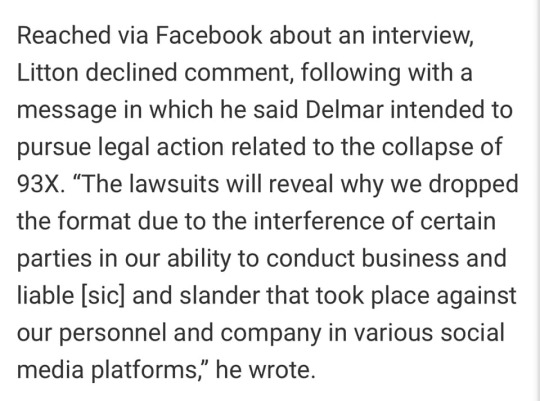
So just for like... summary-
Ya'll took over the station with a committed listener base, claimed that you'd be just continuing business as usual, tried to poach their talent, hired someone with no problem talking shit, and when your station failed...
... you want to blame a Facebook Group?
Are you a child?
Anyways, if you'd like to hear an alternative rock station in Columbus that's just doing their best, here's a link to the stream!
209 notes
·
View notes
Text
XiaoAether in Shanghai‼️
HoYo's official artist's Xiao x Aether illustrations are shown on big screens!

The official XiaoTher animation for Xiao's birthday:

FCC (twitterX: @chenyileiFCC) is FCC is an official illustrator at HoYoverse who makes mainly anime & game IP projects and copyright illustrations (Genshin Impact, Sword Art Online, etc.)
This artist get this present from HoYo:

https://x.com/chenyileiFCC?t=0xPMJIvDQkax4RspRiuDpw&s=09
FCC participates in official Genshin Impact projects.
And.. mainly draw Xiao x Aether.💚💛
FCC's other illustrations:

Genshin Impact Concert Artbook:

One of this artists works is in the official Genshin Impact Illustration Book Collection Vol 1.:


This artist did the official illustration for the Xiao: Vigilant Yaksha Ver. 1/7 Scale Figure box



Xiao x Aether is canon!!! 💚💛
Twitter(X): @xiaoaetherposts
#genshin impact#aether#genshin xiao#adeptus xiao#xiaoaether#xiaother#aexiao#xiao x aether#xiao x traveler#mihoyo#hoyoverse#lantern rite
111 notes
·
View notes
Text
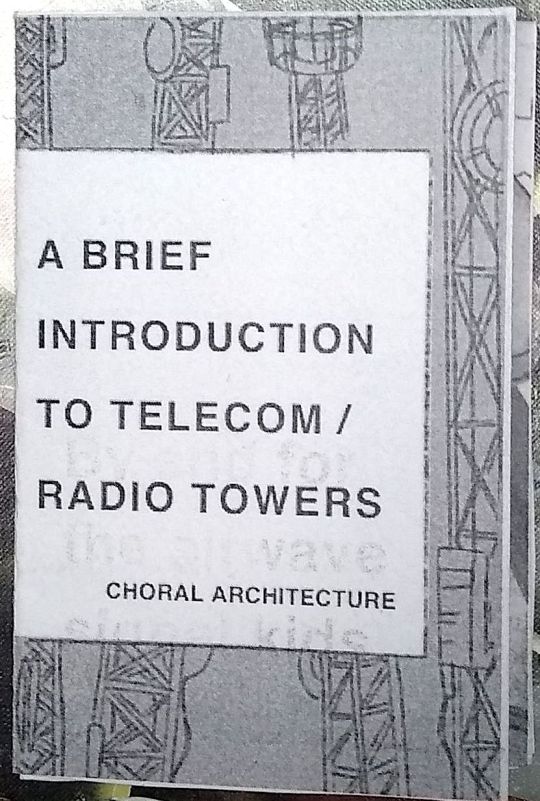
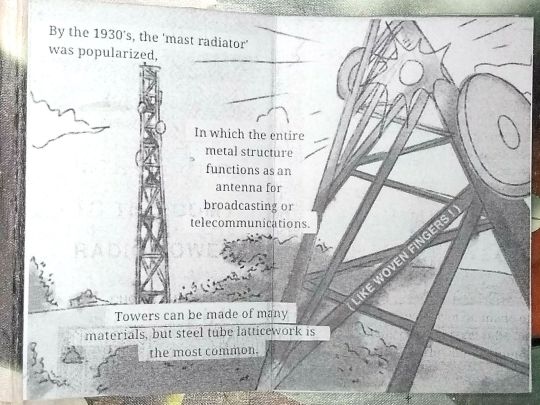
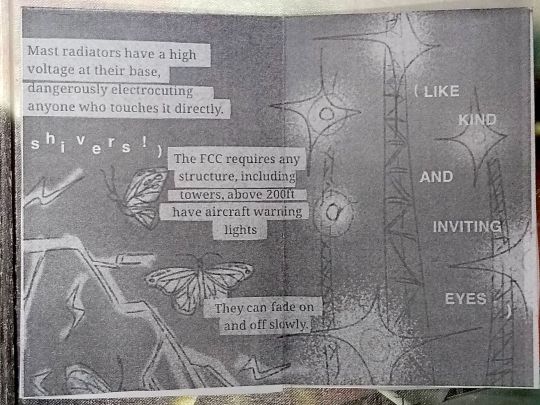
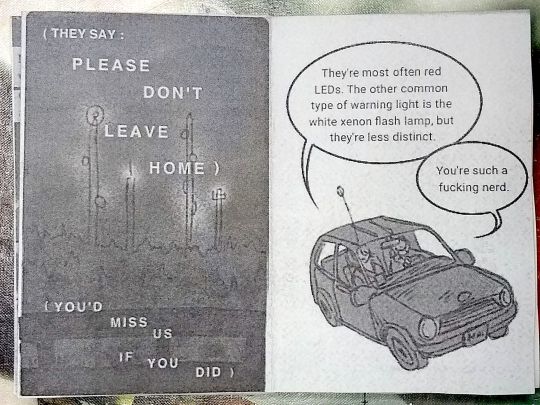
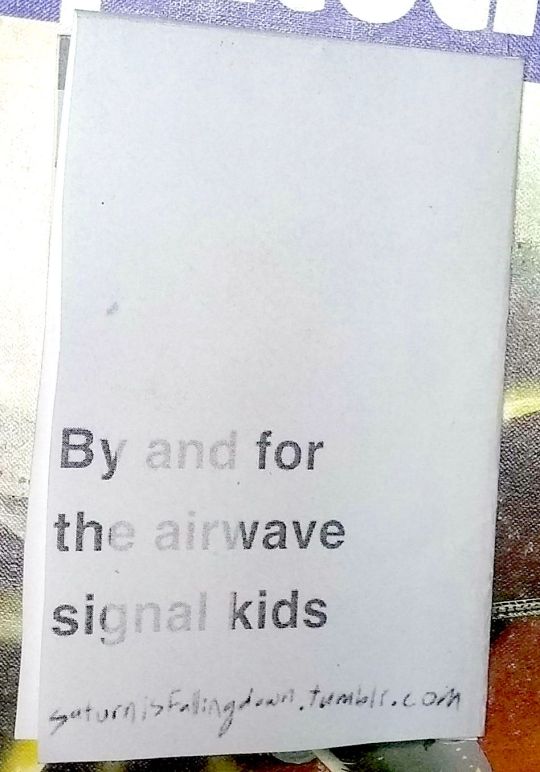
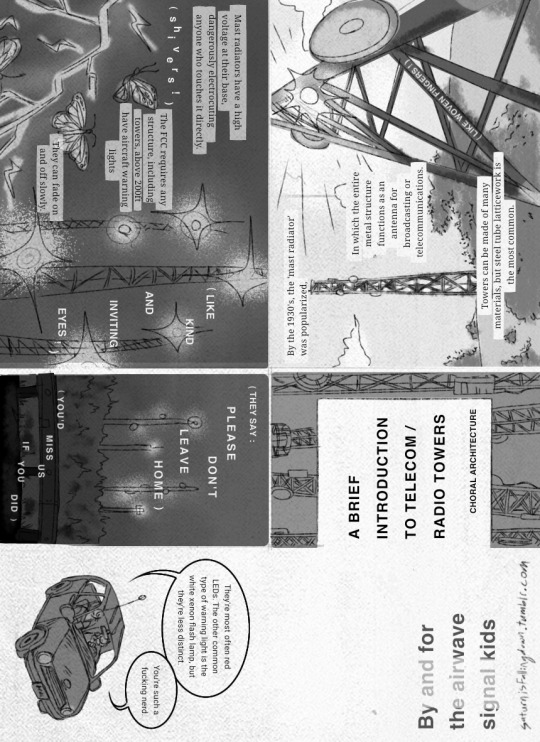
Look at my zine, boy!
[ID: An 8 page printed greyscale zine, with photos posted page by page as well as the full sheet. All pages are illustrations.
Cover: 4 drawn radio towers behind the title "A Brief Introduction To Telecom/Radio Towers" with the words "Choral Architecture" in smaller font.
Pages 1+2: Two radio towers in a sunny field, one at a distance and one right up by the camera, with the sun shining through it. Text reads "By the 1930's, the mast radiator was popularized. / The entire metal structure functions as an antenna for broadcasting or telecommunications. / Towers can be made of many materials, but steel tube latticework is the most common." Across one of the bars of the tower, white text reads "(Like Woven Fingers!)"
Pages 3+4: On the left, a bolt of electricity surrounded by butterflies. On the right, a dark sky with three radio towers lit up with four-pointed-star shaped lights. Text reads "Mast radiators have a high voltage at their base, dangerously electrocuting anyone who touches it directly". White staggered text reads "(shivers!)". The normal text continues "The FCC requires any structure, including towers, above 200ft have aircraft warning lights / they can fade on and off slowly." White text to the side reads "(Like Kind And Inviting Eyes)".
Page 5: A view of 4 radio towers at night seen from a road looking out at a forest horizon. White text reads "(They Say: Please Don't Leave Home) (You'd Miss Us If You Did)".
Page 6: A car on a white background with two people sat inside. A speech bubble from one reads "They're most often red LEDs. The other common type of warning light is the white xenon flash lamp, but they're less distinct". A bubble from the other reads "You're such a fucking nerd".
Back: Text reading "By and for the airwave signal kids". A link to saturnisfallingdown.tumblr.com is written in at the bottom.
End ID]
183 notes
·
View notes
Text
Judd Legum at Popular Information:
In 2024, reliable access to high-speed internet is no longer a luxury; it is a basic necessity. From job applications to managing personal finances and completing school work, internet access is an essential part of daily life. Without an internet connection, individuals are effectively cut off from basic societal activities.
But the reality is that many people — particularly those living around the poverty line — can not afford internet access. Without internet access, the difficult task of working your way from the American economy's bottom rung becomes virtually impossible.
On November 21, 2021, President Biden signed the bipartisan Infrastructure Investment and Jobs Act. The new law included the Affordable Connectivity Program (ACP), which provided up to $30 per month to individuals or families with income up to 200% of the federal poverty line to help pay for high-speed internet. (For a family of four, the poverty line is currently $31,200.) On Tribal lands, where internet access is generally more expensive, the ACP offers subsidies up to $75 per month.
The concept started during the Trump administration. The last budget enacted by Trump included $3.2 billion to help families afford internet access. The FCC made the money available as a subsidy to low-income individuals and families through a program known as the Emergency Broadband Benefit Program. The legislation signed by Biden extended and formalized the program.
It has been a smashing success.
Today, the ACP is "helping 23 million households – 1 in 6 households across America." The program has particularly benefited "rural communities, veterans, and older Americans where the lack of affordable, reliable high-speed internet contributes to significant economic, health and other disparities." According to an FCC survey, two-thirds of beneficiaries "reported they had inconsistent internet service or no internet service at all prior to ACP." These households report using their high-speed internet to "schedule or attend healthcare appointments (72%), apply for jobs or complete work (48%), do schoolwork (75% for ACP subscribers 18-24 years old)."
Tomorrow, the program will abruptly end.
In October 2023, the White House sent a supplemental budget request to Congress, which included $6 billion to extend the program through the end of 2024. There is also a bipartisan bill, the Affordable Connectivity Program Extension Act, which would extend the program with $7 billion in funding. The benefits of the program have shown to be far greater than the costs. An academic study published in February 2024 found that "for every dollar spent on the ACP, the nation’s GDP increases by $3.89."
The program will lapse tomorrow because Speaker Mike Johnson (R-LA) refuses to bring either the bill (or the supplemental funding request) to a vote. The Affordable Connectivity Program Extension Act has 225 co-sponsors which means that, if Johnson held a vote, it would pass.
[...]
The Republican attack on affordable internet
Why will Johnson not even allow a vote to extend the ACP? He is not commenting. But there are hints in the federal budget produced by the Republican Study Committee (RSC). The RSC is the "conservative caucus" of the House GOP, and counts 179 of the 217 Republicans in the House as members. Johnson served as the chair of the RSC in 2019 and 2020. He is currently a member of the group's executive committee.
The RSC's latest budget says it "stands against" the ACP and labels it a "government handout[] that disincentivize[s] prosperity." The RSC claims the program is unnecessary because "80 percent" of beneficiaries had internet access before the program went into effect. For that statistic, the RSC cites a report from a right-wing think tank, the Economic Policy Innovation Center (EPIC), which opposes the ACP. EPIC, in turn, cites an FCC survey to support its contention that 80% of ACP beneficiaries already had internet access. The survey actually found that "over two-thirds of survey respondents (68%) reported they had inconsistent internet service or no internet service at all prior to ACP."
[...]
The RSC also falsely claims that funding for the precursor to the ACP, the Emergency Broadband Benefit Program (EBB), "was signed into law at the end of President Biden’s first year in office." This is false. Former President Trump signed the funding into law in December 2020.
The RSC's position is not popular. A December 2023 poll found that 79% of voters support "continuing the ACP, including 62% of Republicans, 78% of Independents, and 96% of Democrats."
In 2024, access to the internet is a necessity and not just a luxury, and the Republicans are set to end the Affordable Connectivity Program if no action is taken. The Affordable Connectivity Program (ACP) provided subsidies to low-income people and families to obtain internet access.
#Internet#Internet Access#Affordable Connectivity Program Extension Act#Affordable Connectivity Program#Infrastructure Investment and Jobs Act#IIJA#Emergency Broadband Benefit Program#Republican Study Committee#Economic Policy Innovation Center
34 notes
·
View notes
Video
youtube
The Truth About Corporate Subsidies
Why won't big American corporations do what's right for America unless the government practically bribes them?
And why is the government so reluctant to regulate them?
Prior to the 1980’s, the U.S. government demanded that corporations act in the public interest.
For example, the Clean Air Act of 1970 stopped companies from polluting our air by regulating them.
Fast forward to 2022, when the biggest piece of legislation aimed at combating the climate crisis allocates billions of dollars in subsidies to clean energy producers.
Notice the difference?
Both are important steps to combating climate change.
But they illustrate the nation’s shift away from regulating businesses to subsidizing them.
It’s a trend that’s characterized every recent administration.
The CHIPS Act –– another major initiative of the Biden administration –– shelled out $52 billion in subsidies to semiconductor firms.
Donald Trump’s “Operation Warp Speed” delivered over $10 billion in subsidies to COVID vaccine manufacturers.
Barack Obama’s Affordable Care Act subsidized the health care and pharmaceutical industries.
George W. Bush and Obama bailed out Wall Street following the 2008 economic crash while providing about $80 billion in rescue funds for GM and Chrysler.
And the federal government has been subsidizing big oil and gas companies for decades, to the tune of hundreds of billions of dollars.
Before the Reagan era, it was usually the case that America regulated rather than subsidized big business to ensure the wellbeing of the American public.
The Great Depression and FDR’s Administration created an alphabet soup of regulatory agencies — the SEC, FCC, FHA, and so on — that regulated businesses.
Corporations were required to produce public goods, or avoid public “bads” like a financial meltdown, as conditions for staying in business.
If this regulatory alternative seems far-fetched today, that’s because of how far we’ve come from a regulatory state to a subsidy state.
Today it’s politically difficult, if not impossible, for government to demand that corporations bear the costs of public goods. The government still regulates businesses, of course –– but one of the biggest things it does is subsidize them. Just look at the growth of government subsidies to business over the past half century.
The reason for this shift is corporations now have more political clout than ever before.
Industries that spend the most on lobbying and campaign contributions have often benefited greatly from this shift from regulation to subsidy.
Now, subsidies aren’t inherently bad. Important technological advances have been made because of government funding.
But subsidies are a problem when few, if any, conditions are attached — so there’s no guarantee that benefits reach the American people.
What good is subsidizing the healthcare industry when millions of Americans have medical debt and can’t afford insurance? What good are subsidies for oil companies when they price gouge at the pump and destroy the planet? What good are subsidies for profitable semiconductor manufacturers when they’re global companies with no allegiance to America?
We’re left with a system where costs are socialized, profits are privatized.
Now, fixing this might seem daunting — but we’re not powerless. Here’s what we can do to make sure our government actually works for the people, not just the powerful.
First, make all subsidies conditional, so that any company getting money from the government must clearly specify what it will be spent on – so we can ensure the funds actually help the public.
Second, ban stock buybacks so companies can’t use the subsidies to pump up their profits and stock prices.
Third, empower regulatory agencies to do the jobs they once did — forcing companies to act in the public interest.
Finally, we need campaign finance reform to get big corporate money out of politics.
Large American corporations shouldn’t need government subsidies to do what’s right for America.
It’s time for our leaders in Washington to get this message, and reverse this disturbing trend.
276 notes
·
View notes
Text
This day in history
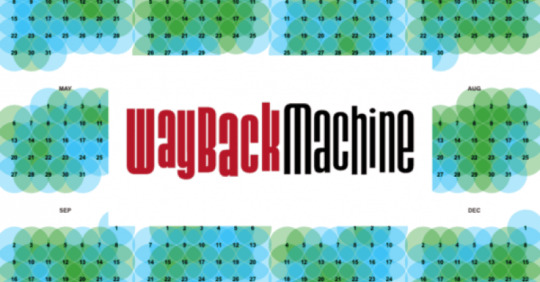
NEXT WEEKEND (June 7–9), I'm in AMHERST, NEW YORK to keynote the 25th Annual Media Ecology Association Convention and accept the Neil Postman Award for Career Achievement in Public Intellectual Activity.

#15yrsago D&D-style map of C++ https://alenacpp.blogspot.com/2009/06/c.html
#15yrsago Passive-aggressive umbrella-cops foil Tiananmen reportage https://news.bbc.co.uk/1/hi/world/asia-pacific/8082604.stm
#15yrsago Heartbroken cereal litigant loses suit over non-existence of “Crunchberries” https://www.loweringthebar.net/2009/06/reasonable-consumer-would-know-crunchberries-are-not-real-judge-rules.html
#15yrsago DC’s buried, secret government wires patrolled by rapid-response goon-squad https://www.washingtonpost.com/wp-dyn/content/article/2009/05/30/AR2009053002114.html
#15yrsago Visualizing how a dirty Congresscritter turned campaign contributions into earmarks https://web.archive.org/web/20090606211116/http://blog.sunlightfoundation.com/2009/06/04/vis-a-visclosky-or-how-i-learned-to-take-campaign-contributions-and-turn-them-into-earmarks/
#15yrsago TOSBack: EFF’s real-time tracker for changes in terms of service on popular Internet sites https://www.eff.org/press/archives/2009/06/03-0
#10yrsago Colbert viewers learned more about super PACs than news-junkies https://www.annenbergpublicpolicycenter.org/stephen-colberts-civics-lesson-or-how-a-tv-humorist-taught-america-about-campaign-finance/
#10yrsago FCC’s website crashes, John Oliver’s army of Cable Company Fuckery trolls blamed https://yro.slashdot.org/story/14/06/03/2259240/fcc-website-hobbled-by-comment-trolls-incited-by-comedian-john-oliver
#10yrsago Secret service developing a sarcasm detector. Oh great. https://web.archive.org/web/20140604004533/https://www.fbo.gov/?s=opportunity&mode=form&id=8aaf9a50dd4558899b0df22abc31d30e&tab=core&_cview=0 #10yrsago Five dumb things that NSA apologists should really stop saying https://www.eff.org/deeplinks/2014/06/top-5-claims-defenders-nsa-have-stop-making-remain-credible
#5yrsago Empirical analysis of behavioral advertising finds that surveillance makes ads only 4% more profitable for media companies https://memex.craphound.com/2019/06/04/empirical-analysis-of-behavioral-advertising-finds-that-surveillance-makes-ads-only-4-more-profitable-for-media-companies/
#5yrsago European legal official OKs orders that force Facebook to globally remove insults to politicians like “oaf” and “fascist” (as well as synonyms) https://memex.craphound.com/2019/06/04/european-legal-official-oks-orders-that-force-facebook-to-globally-remove-insults-to-politicians-like-oaf-and-fascist-as-well-as-synonyms/
#5yrsago The New York Privacy Act goes even farther than California’s privacy legislation https://www.wired.com/story/new-york-privacy-act-bolder/
#5yrsago Joe Biden repeatedly claimed to have marched for civil rights. He didn’t. https://www.nytimes.com/2019/06/03/us/politics/biden-1988-presidential-campaign.html
#5yrsago Why is there so much antitrust energy for Big Tech but not for Big Telco? https://memex.craphound.com/2019/06/04/why-is-there-so-much-antitrust-energy-for-big-tech-but-not-for-big-telco/
#5yrsago Magic for Liars: Sarah Gailey’s debut is a brilliant whodunnit in the vein of The Magicians https://memex.craphound.com/2019/06/04/magic-for-liars-sarah-gaileys-debut-is-a-brilliant-whodunnit-in-the-vein-of-the-magicians/
#1yrago Ayyyyyy Eyeeeee https://pluralistic.net/2023/06/04/ayyyyyy-eyeeeee/
15 notes
·
View notes
Text
Net neutrality restored as FCC votes to regulate internet providers | AP News
18 notes
·
View notes
Text
"If I'm Trump, I need you to not vote for Biden"
May 2024 Politico analysis: Polling of younger, Black, Hispanic voters in Philadelphia is currently favoring a Trump presidency by a hair:
“The goal for the Biden campaign is to try to keep that fragile coalition together. And it’s a much harder goal than it is for the Trump campaign, which is just to have people do nothing,” said Mustafa Rashed, a Philadelphia-based Democratic strategist. “If I’m Trump, I don’t need you to come out and vote for me, I need you to not go out and vote for that guy.”
If you WANT a second Trump administration, along with Project 2025's very real plan to give Trump supreme executive power, it's very easy for you: Simply DO NOT vote for Biden in November.
(And get some friends to not-vote for Biden too, while you're at it.)
It's really, really simple:
Vote 3rd party or don’t vote:
Trump presidency, again
Replace courts and justice system with dictator-style "justice"
(Which by the way pretty much eliminates any kind of free elections in the future)
Defund federal institutions that protect individual rights like the FCC (internet) and FTC (consumer rights)
Let's get dumber! No more Department of Education
More fossil fuels, more climate change faster!
Eliminate access to abortion
Normalize the use of the military against US citizens, and of course
Full support to Netanyahu to "finish the problem" and ensure Palestinians "burn forever in the eternal pit of hell."
Vote Biden and you get:
NOT all that stuff above. That's enough, right? Just avoiding all that is enough? No? Okay then how about:
Health care - including abortion access
Continued improvements in overall cost of living
Continued investment in green technologies and getting toward net-zero emissions
Continued reduction of the wage gap
More? Okay:
Support for Ukraine against Russia
Massive social spending for healthcare and against climate change like under the Inflation Reduction Act
Taxing the rich
Gun control
Improving infrastructure like roads, railways, the power grid, and internet access
Continued crackdowns on Big Tech and strengthening the FTC's antitrust powers
Increased pressure on Netanyahu and Israel
So, do you take the action or inaction that makes you, personally, feel better?
Or do you take the action that actually brings the greatest good to the greatest number of people - even if it makes you personally feel bad to do it?
8 notes
·
View notes
Text
When DiC went to translate the Legend of Zelda into a Saturday morning cartoon there were naturally a lot of challenges.
One of the main issues with the game is the constant stream of enemies. Hardware limitations of the time meant that enemies respawn after a few screens have been traversed. But what does that look like in a cartoon?
The team behind the animated Zelda cartoon actually came up with a nifty canonical way to both respawn enemies and not have them constantly being violently killed (likely to appease the FCC guidelines overseeing kids media at the time).

Ganon just has an “evil jar.” It’s literally just a large jar that (when an enemy has been zapped by Link’s sword) get transported and respawn back in the jar. It’s a novel little piece of lore and world building that was sadly absent in all Zelda games…
Until Breath of the Wild and Tears of the Kingdom.

To explain how enemies respawn, Nintendo created the blood moon. Now when a blood moon rises, all previously slain monsters are respawned. This helps keep the open world gameplay engaging. But it’s also really cool that is very similar to the idea that DiC came up with in the 80’s.
Almost 30 years apart and yet the 80’s cartoon still has relevancy!
49 notes
·
View notes
Text
So I have a moral conundrum regarding a scam that keeps hitting me up.
So I keep getting spam calls asking me if I want to donate money to various police associations. The names keep changing but the script they read is nearly identical each time. They tell me the name of the association and say they they are raising money to help equip police departments and for the families of fallen officers.
2 things:
1. I am on the Do Not Call list, so these are illegal calls. I usually report spam calls on the FCC website because I hate them and reporting them is like playing whack-a-mole. I mean, I'm the kind of guy who accepts all those random friend requests on Snapchat just for the satisfaction of reporting the bots trying to sell me an onlyfans.
2. I looked up these "police associations" scams and it turns out that they are mostly "legit" fundraising campaigns. Legit only in the sense that they do raise money and give some of it to the cops. But only as much as they legally have to in order to stay in business. The amount of money kept by these scams for "administrative costs" is always somewhere in the high 90%s.
So these guys are taking money from people who actually want to help the police and give almost none of it to the actual cops.
So my conundrum is this: I hate scams and I hate illegal calls and I LOVE reporting them... But... Like... They are taking money from people who like the cops... I would do that if I could get away with it. I respect this scam in that regard. Should I keep reporting them or just hang up and move on with my life?
27 notes
·
View notes
Text
GRV.T-SSG SYSTEMS VER 11/22/23

Hey, guys, just wanna remind y'all, that Bad Internet Bills has a collection of information on the United States Government's intentions to surveil and control the Internet Infrastructure to the point of violating privacy and civil liberties of the people.
The RESTRICT ACT (aka "TikTok Ban Bill"), along with a host of other bad bills, basically intends to criminalize dissent and penalize individuals using or interacting with digital infrastructure they deem 'foreign adversaries' with million dollar fines, and more than 20+ years of prison time.
It's a bad scene, and I would urge you all to look into these bills, get in contact with your representatives, lawmakers, and make some noise about this. We've already been doing this, but for anyone who isn't 100% about the issue, now if your time. Research.
Check out TikTok user, diedmadaboutit (Diggity) and their summary of the RESTRICT bill, spread those summary videos around. They urge you to read the bill on your own, however. The spread of information beyond mine or their perspectives is vital to preventing it from becoming a reality.
(The recent FCC report from Brendan Carr might have something to do with this bill, or not. I'm not sure.)
Don't just reblog this or like this and call it a day. Create your own post(s) about it,, talk to the people you know off-line about it. Get people engaged in what will have far reaching consequences for everyone in the States.
Keep your heads, keep your cool. Use your dread and fears to create informed organization around the prevention of our government from stripping us of our rights.
Because if they can do it here, they will do it elsewhere.
Happy hunting.
(gif by freminet)
15 notes
·
View notes
Text
John Nichols at The Nation:
Donald Trump has made no secret of his determination to govern as a “dictator” if he regains the presidency, and that’s got his critics warning that his reelection would spell the end of democracy. But Trump and his allies are too smart to go full Kim Jong Un. Rather, the former president’s enthusiasm for the authoritarian regimes of Russia’s Vladimir Putin, Turkey’s Tayyip Erdoğan, and Hungary’s Viktor Orbán suggests the models he would build on: managing elections to benefit himself and his Republican allies; gutting public broadcasting and constraining press freedom; and undermining civil society. Trump, who famously demanded that the results of Georgia’s 2020 presidential voting be “recalculated” to give him a win, wants the trappings of democracy without the reality of electoral consequences. That’s what propaganda experts Edward Herman and Frank Brodhead once described as “demonstration elections,” in which, instead of actual contests, wins are assured for the authoritarians who control the machinery of democracy.
The outline for such a scenario emerges from a thorough reading of Project 2025’s Mandate for Leadership, which specifically proposes a Trump-friendly recalculation of the systems that sustain American democracy. The strategy for establishing an American version of Orbán’s “illiberal democracy” is not spelled out in any particular chapter of Mandate. Rather, it is woven throughout the whole of the document, with key elements appearing in the chapters on reworking the Department of Homeland Security (DHS), the Federal Communications Commission (FCC), and the Federal Election Commission (FEC). In the section on the DHS, for instance, there’s a plan to eliminate the ability of the agency that monitors election security to prevent the spread of disinformation about voting and vote counting.
How serious a threat to democracy would that pose? Think back to November 2020, when Trump was developing his Big Lie about the election he’d just lost. Trump’s false assertion that the election had been characterized by “massive improprieties and fraud” was tripped up by Chris Krebs, who served as director of the Cybersecurity and Infrastructure Security Agency (CISA) in the DHS.
The Republican appointee and his team had established a 24/7 “war room” to work with officials across the country to monitor threats to the security and integrity of the election. The operation was so meticulous that Krebs could boldly announce after the voting was finished: “America, we have confidence in the security of your vote, you should, too.” At the same time, his coordinating team declared, “The November 3rd election was the most secure in American history.” This infuriated Trump, who immediately fired the nation’s top election security official.
In Mandate’s chapter on the DHS, Ken Cuccinelli writes, “Of the utmost urgency is immediately ending CISA’s counter-mis/disinformation efforts. The federal government cannot be the arbiter of truth.” Cuccinelli previously complained that CISA “is a DHS component that the Left has weaponized to censor speech and affect elections.” As for the team that worked so successfully with Krebs to secure the 2020 election, the Project 2025 document declares that “the entirety of the CISA Cybersecurity Advisory Committee should be dismissed on Day One.” The potential impact? “It’s a way of emasculating the agency—that is, it prevents it from doing its job,” says Herb Lin, a cyber-policy and security scholar at Stanford’s Center for International Security and Cooperation.
This is just one way that Project 2025’s cabal of “experts” is scheming to thwart honest discourse about elections and democracy. A chapter on public broadcasting proposes to defund the Corporation for Public Broadcasting as part of a larger plan to upend NPR, PBS, and “other public broadcasters that benefit from CPB funding, including the even-further-to-the Left Pacifica Radio and American Public Media.” More destabilizing than the total funding cut that Project 2025 entertains is a parallel plan to end the status of NPR and Pacifica radio stations as “noncommercial education stations.” That could deny them their current channel numbers at the low end of the radio spectrum (88 to 92 FM)—a move that would open prime territory on the dial for the sort of religious programming that already claims roughly 42 percent of the airwaves that the FCC reserves for noncommercial broadcasting. And don’t imagine that the FCC would be in a position to write new rules that guard against the surrender of those airwaves to the Trump-aligned religious right.
[...]
While project 2025 seeks to rewire the FCC to favor Trump’s allies, it also wants to lock in dysfunction at the Federal Election Commission, the agency that is supposed to govern campaign spending and fundraising. Established 50 years ago, the FEC has six members—three Republicans and three Democrats—who are charged with overseeing the integrity of federal election campaigns. In recent years, however, this even partisan divide has robbed the FEC of its ability to act because, as a group of former FEC employees working with the Campaign Legal Center explained, “three Commissioners of the same party, acting in concert, can leave the agency in a state of deadlock.” As the spending by outside groups on elections “has exponentially increased, foreign nationals and governments have willfully manipulated our elections, and coordination between super PACs and candidates has become commonplace,” the former employees noted. Yet “the FEC [has] deadlocked on enforcement matters more often than not, frequently refusing to even investigate alleged violations despite overwhelming publicly available information supporting them.”
John Nichols wrote in The Nation about how Project 2025’s radical right-wing wishlist of items contains plans to wreck and subvert what is left of America’s democracy.
See Also:
The Nation: June 2024 Issue
#John Nichols#The Nation#Project 2025#Donald Trump#Authoritarianism#FCC#FEC#Federal Elections Commission#Federal Communications Commission#Corporation for Public Broadcasting#Cybersecurity and Infrastructure Security Agency#Chris Krebs
19 notes
·
View notes
Text

#QSLfriday WCAO, founded in 1922, was the second broadcasting station licensed in Maryland, following WKC, also in Baltimore, which had been licensed the previous March. The station's call letters, WCAO, were randomly assigned from a sequential roster of available call signs.
The Monumental Radio Company acquired the station in 1926. In the 1930s, WCAO was powered at 1,000 watts by day and 500 watts at night. It was a CBS Network affiliate during the 1930s and 1940s.
Committee to Preserve Radio Verifications | Tumblr Archive
--
John S. responded to this post: "This is not a QSL letter for WCAO, but rather for W3XES, which was no doubt an experimental 'Apex' high fidelity station that WCAO operated in the 'Ultra Shortwave' band. Apex stations were the predecessors to FM broadcasting."
James S. wrote: "Apex (200 kHz wide AM operating in the low VHF up to 50 MHz band) and FM operated together for a short time so the FCC could determine if either or one was better for a better audio service. Both were considered experimental until the decision was made to go with FM in 1940. WCAO could have been trying both or either."
2 notes
·
View notes